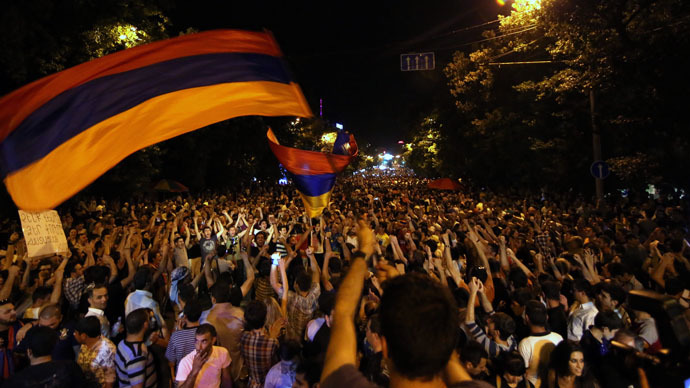Tariff freeze & police brutality probe: Armenia protesters outline demands

Armenian protesters have rejected the PM’s requests to dismantle barricades in central Yerevan and have outlined their requests. Alongside the freezing of electricity tariffs, protesters are demanding the use of force by police officers be investigated.
As protests have entered the seventh day, Armenian Prime Minister Hovik Abrahamyan called on activists to clear the Marshal Baghramyan Avenue in the center of the capital, saying that the illegal barricades have been disrupting the traffic and irritating residents.
READ MORE: Armenia police vow to stay put as long as protests remain peaceful
“This style (of protest) will not bring any success. Blocking one of the main avenues of the capital, the obstruction of citizens’ free movement, will not bring any benefit. I urge activists to return to a constructive field as the government is ready to discuss any issue,” Abrahamyan said, according to Arka news agency.
“Hovik Abrahamyan’s statements mean absolutely nothing to us,” a member of the ‘No to Robbery’ movement told Armenian radio station Azatutyun.
Insisting their protest is absolutely apolitical, protesters issued a list of demands to be met by the government. First of all, activists want a June 19 decision to raise electricity prices to be retracted, after which the government should start negotiations with civil society activists on reducing these tariffs.
“We do not belong to any political force,” activists told the crowd, as cited by RIA. “We will always be with the people, preventing robbery.”
Separately protesters want those involved in Tuesday dispersal of the march brought to justice, particularly the alleged “plain-clothes” officers who used force against activists and journalists, Sputnik reports.
Meanwhile the demonstration seems to be growing and spreading to adjacent streets as far as Paris Square some two kilometers away, disrupting traffic even further. At the same time, a similar sit-in in Armenia’s second largest city, Gyumri, is continuing for the fourth day.
OP-EDGE: Pro-West NGOs, Armenian unrest and the destabilization of Russia
On the ground in Yerevan, activists are issuing warnings to the government saying that soon “their patience will run out.”
“You can see that every day the number of our supporters increases, but let them [the authorities of Armenia] not think that we will limit ourselves to this. Our patience is not unlimited,” one organizer was quoted by Armenia Today as saying. “The cup of our patience is overflowing. We gave them enough time to solve this problem.”
Despite the growing strength and impatience among the protesters, police are so far refusing to use force against the illegal assembly. “Today we are not going to take any action against demonstrators,” the deputy chief of Yerevan Police, Colonel Valery Osipyan told reporters.
Armenia’s PM meanwhile tried to defend the rise of electricity tariffs and promised to help low-income families to cope with the hike.
READ MORE: Armenian protests resemble Ukrainian Maidan coup scenario - Russian MP
“Our society believes that the price rise is caused by abuse or, in lay terms, by plunder. But I would blindingly say irrespective of what misuse was found in the company [Electric Networks of Armenia], no single dram of this was incorporated in the tariff calculation,” the premier said at Thursday’s government meeting. In fact, he said, since 2007 some $47 million of the company’s expenses have not been included in the tariffs for the population.
The recent price increase, according to the PM, stems from a drought impacting hydro power plants, and the “88-day standstill” at atomic power stations, in addition to a 20 percent devaluation of the national currency over the last three years. Without the price increase the country may face continued blackouts, according to Abrahamyan.
Low income families numbering some 400,000 people who cannot afford the tariff increase might be offered subsidies for electricity costs, the PM added. The government is looking to offer some 2,000 drams per month in relief to compensate the 16.7 percent price hike, which for an average family that consumes 200 kilowatt per month will result in a 1,400 drams electricity bill increase.












